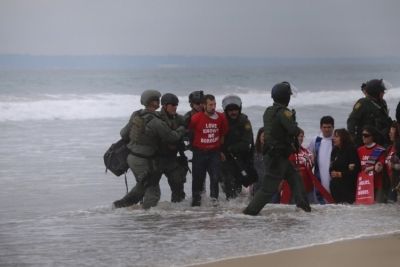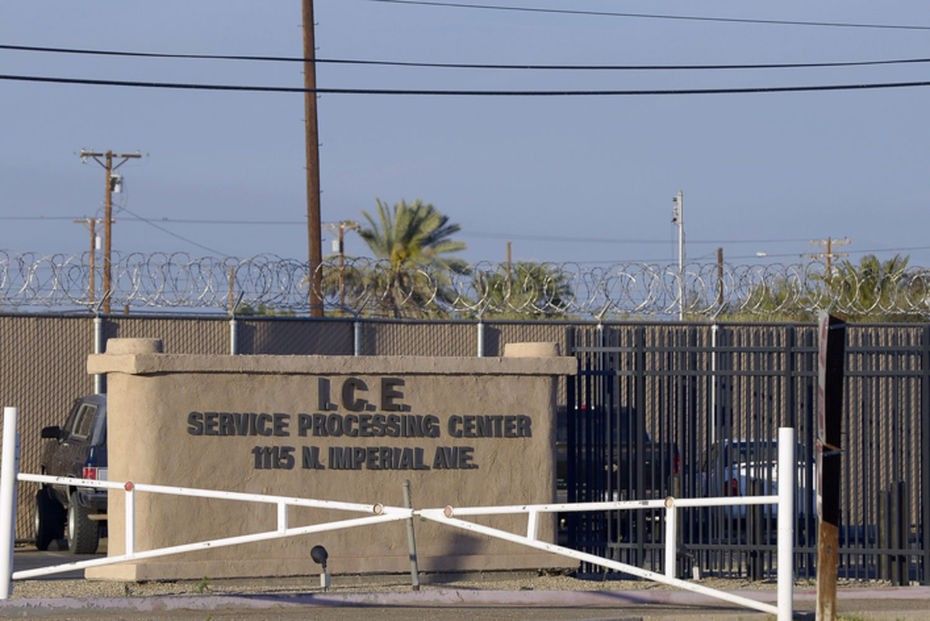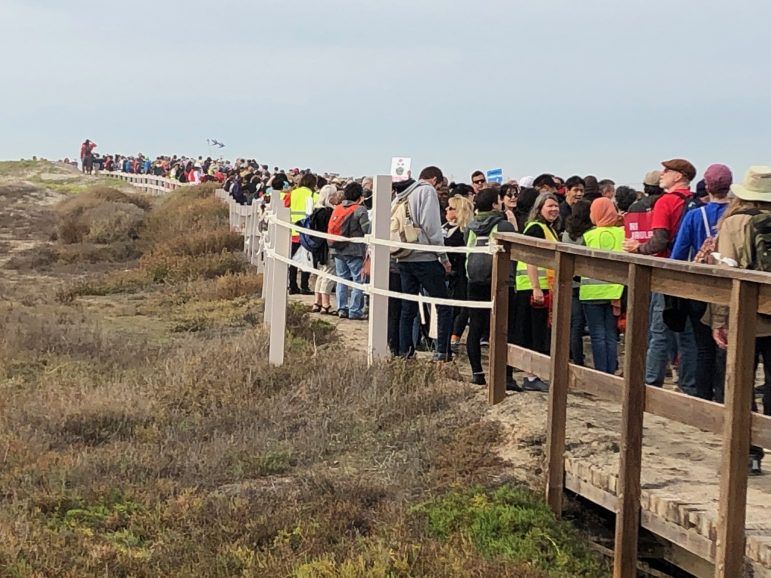By Matt Leber
On Monday, December 10th of last year, American Friends Service Committee (AFSC) led a mobilization of faith leaders from across the country to the enforcement zone on the U.S./Mexico border for Love Knows No Borders, a call for a world without walls. It was there, at the edge of the ocean, where they came face to face with riot gear-clad border agents. Here, in the second of a two-part series, Matt Leber of AFSC describes being arrested and detained overnight.
It was December 10thand I was standing on the beach, a few feet outside the enforcement zone on the U.S./Mexican border, when a Border Patrol Agent stepped around Bishop Minerva Carcaño and her courageous team and grabbed me. My backpack was ripped off and thrown it to other agents. The Council of American Islamic Relations was there in force as a part of the action and caught the Border Patrol rush toward us and my detainment on film.
As I felt my arm twisted behind my back and hands squeezing the back of my neck, I heard Border Patrol officers yell, “We got the instigator… we got him.” They cuffed my hands behind my back, ordered officers to “isolate him” from the others who were arrested and to mark me with a 111 charge. I’d learn later this was the charge of “Assault on a Federal Officer,” a charge that can get over 10 years in prison.

Imperial Beach Detention Center with incarcerated children
Still handcuffed, I was brought to the Imperial Beach Border Patrol detention center. As we pulled in an armed agent yelled “Alright! More bodies!” Inside, the detention center looked very much like a hospital, save for a string of armed border patrol agents behind computers and fingerprinting stations. On the way to my cell I suddenly realized that there were dozens and dozens of others who were incarcerated here. All were brown-skinned folks from Mexico and Central America, most of whom had recently attempted to cross the border. To my immediate left was a large glass window and a highly-secured heavy metal door leading to a room containing over a dozen children. They appeared to be ages five to fifteen, by themselves without any adult caregivers. Another cell contained women with their infants and toddlers. Another contained men, perhaps the parents of some of children in the other room.
I was stripped of my possessions and everything in my backpack was reviewed. My cell phone was locked but they looked through my paperwork. Without a word, I was put into Cell 7, an empty eight-foot by twelve-foot room, with bright fluorescent lights, one metal bench, a metal toilet, and a one-inch thick mattress pad. For the first four hours I was invigorated from the power of our action, and began to exercise, stretch, sing, and meditate. I would rise occasionally and peek out to watch armed agents fingerprint 8-, 10- and 12-year-old children, together with mothers as they breastfed their babies or held their toddler’s hand. It was surreal. I was really watching children being separated from families and put into cold locked rooms. For brief moments, I would forget where I was as I made faces with the children and we smiled and, for a brief moment, laughed with each other.
After a couple of hours, I was searched for the fourth time and then brought into a room and read my rights and told I would be interviewed. I did not consent to the interview without an attorney and asked to be able to speak with one and to make my phone calls. I was informed by the officer that I would get to talk to an attorney, but not until they transferred me from this “holding” cell to the actual detention center.
I was in the Imperial Beach Border Patrol Detention Center from 2 p.m. on Monday, December 10thuntil 6:30 a.m. on December 11th. Except for the 5 minutes during which they informed me of my rights and my charge (Assault on a Federal Officer), I did not leave the isolation cell. As Monday night drew on, I attempted to sleep. The lights were bright, the room was cold and I didn’t have any blanket or layers, and my shoes and pants were still wet from being in the ocean earlier that day. The noise of officers shouting out the numbers of cell doors to be opened, plus the regular opening and slamming of those doors, the sounds of children crying, and the occasional yell of officers in English (I assume to the children) to “Sit the fuck down,” made it difficult to sleep. I knew I was in the midst of an inhumane system but the yelling and swearing at children was still jarring. At 10 p.m., I knocked on my cell door. One officer looked at me and I made the motion of being cold and motioned a request for a blanket. He shook his head in the negative and then turned away. At 1 a.m., I repeated the request to a new officer and he did get me a tin foil-like “astronaut blanket.” Not comforting, but it did help hold my body heat and I finally got a few hours of broken sleep.

Transfer from Imperial Beach Border Patrol Detention Center to U.S. Marshalls Detention Center
At 6:30 a.m. on Tuesday, “Seven!” was yelled, and my door opened to an officer saying: “Let’s go! You are being transferred.” I rapidly moved from broken sleep to up and ready to go. I was handcuffed and searched again. My backpack with wallet, phone, and materials was brought out. I also had to put my belt and my shoelaces into my backpack.
Agents went through it and informed me that they wouldn’t touch my property except to confirm the contents and that they would be holding it for up to 30 days. They asked me to sign a document that absolved them of any responsibility of damage to the contents. I wanted to read the document to be clear but then the driver spoke. “If we don’t go in five minutes,” he said,” you are going to have to stay here another day.” Taking a risk, I quickly signed the document. Agents informed me that I or my “designee” could come back to the facility at any time, 24/7, to retrieve my possessions.
Handcuffed with my hands behind my back and the cuffs cutting into my wrists, I was searched again and then placed into a caged van. On the way to the detention centers in downtown San Diego, we took another hour to pick up three other detained people.
Transfer to Metropolitan Correctional Center and the U.S. Marshalls Detention Center
Around 8 a.m. we arrived at the Metropolitan Correctional Center, just next to the U.S. Marshalls Service Center Detention Center.
Once inside, we were un-handcuffed, told to put our hands on the wall, and then searched and then re-cuffed. We were moved into a warehouse space with a metal detector that felt like a full radiation machine. Each of us stood on the platform that moved us through the machine while another officer watched a screen that showed our skeletons, muscles and insides, looking to see if we had drugs or weapons inside our body. From the metal detector, a nurse rapidly fired questions to each of us to determine if we had HIV/AIDS, tuberculosis, or might be suicidal.
At this point, about 15 of us were brought into a cold warehouse. We were called by name (for the first and last time) and given numbers. The agent who checked me in yelled to the others: “This is the guy who beat up one of our officers.” Then he asked, with a smile, “Why you beating up officers?” Having been warned to remain silent and worried that anything I said could be “used against me,” I let him know I didn’t intend to ignore him, but it was better for me not to respond.
We were lined up and un-cuffed and told to strip naked. We stood there in the cold for a few minutes and an officer searched each of us again and told to cough at the appropriate times. We were handed brown jumpsuits and Crocs. Mine were about 10 sizes too big. Five of us were corralled into a small, dank cell with one metal toilet. One of us had to defecate and we all averted our eyes. A few of the officers laughed and made jokes about the smell.
We were handed a sheet with a number on it and told to memorize it. I was 760292. We were then paired up and shackled to each other, my left hand to the right arm of a brother from Central America. The two of us were then shackled to the two who were in front of us. Additionally, we each received our own foot shackle that kept us from walking more than a foot before the metal cuffs would cut into our ankles. We learned to shuffle walk. We were then walked underground from the MCC to the U.S. Marshalls Detention. Some officers were respectful and allowed us to receive water, some just ignored us. Most spoke to us only in English. For the next several hours I was with 6 other men. All Spanish speaking, two of whom were bilingual (English / Spanish).
After a few hours we were brought to another room to get photographed and fingerprinted (and searched) once again. The officers doing the interview only spoke English, which compelled a couple of us to provide translation as best we could. The officers couldn’t or wouldn’t pronounce people’s names correctly even to the point of being indistinguishable. “Ro” was “Raul,” “Jose” for “Juan”… The only Spanish they would speak would be to say “Say Queso” with an American accent as a way to indicate they were about to take a photo. Between interviews the officers talked to each other, telling racist and sexist jokes and otherwise ignoring our existence.
We heard rumors that we would be going to court (for arraignment) and were brought to another cell. This one was 10 feet by 20 feet and held about 25 of us at one point. There was another cell filled with women across from us. Some of the guys knew each other as they had attempted to cross together at 4 a.m. that same morning. Others had come in the day before. I was one of two white, non-Latino guys. As we waited, I made small talk with a few of the guys and attempted to follow the jokes that folks were sharing. A couple guys asked me what I did. Even though I assumed everything was being recorded, I became more bold and told them I had been part of a gathering of faith leaders from all over the country speaking up for migrant justice and against racist polices at the border. I told them that I was at a protest and even though an agent attacked me, I was nonetheless going to be charged me with assaulting an officer.
Around 2 p.m., my name was called and I was brought into three different cells in a 15-minute period. Never informed as to why. Finally, I was told that I was going to be seeing my attorney. Then I was told that I wasn’t going to be seeing my attorney but that I would be getting released. I was given back my clothes (with no belt or shoe laces) and was un-handcuffed and unshackled. I asked about getting my property, as my “property sheet” had been taken from me. They had lost my property sheet and didn’t know anything about it. An officer told me: “All we know is that we were told to release you into the street.” With no phone, no money I was released onto Front Street. I figured I could borrow someone’s cell phone and call AFSC San Diego.
Released from Detention
Within 30 seconds of being released, I saw a group of my colleagues. It was a powerful moment as Kathryn, Kristin, Zeb, Denise, and Benjamin and others greeted me with celebratory hugs. It was so good to see them, to be welcomed after 24 hours locked up, with warmth, care, listening ears, and shared stories of the last day. I had barely eaten during my time inside and so they took me out to eat.
What I didn’t know was that all of this time, my AFSC colleagues and new friends in our partner organizations—including Council on American and Islamic Relations (CAIR), Poor People’s Campaign, Interfaith Movement for Human Integrity, Unitarian Universalists, Methodists, our teams of volunteers who had been “throwing down” so powerful for the last week— had no idea where I was. That they had been calling all of the detention centers and receiving no information. That CAIR had videoed the attack on me and that it had gone viral. That folks went to Imperial Detention Center where agents refused to share any information about my existence, let alone whereabouts. That they were preparing to organize a press conference, and that CNN had already agreed to show up and had organized a calling campaign to get folks to work on my release.
The Power of Organized People
It became clear to me that it was the power of organized people who were dedicated and committed that helped with my release, and hopefully, the dropping of the charges, designed to shut us up and make us go away. Charges that could have altered the course of the next decade of my life. Charges that are used on so many organizers, including immigrant justice organizers in the U.S. without U.S. citizenship. Organizers who stand to lose so much for speaking up and do so anyway.

Next Steps
A couple weeks after the action, people continue to organize at the border. Of the thousands of migrants in the caravan that arrived in Tijuana, hundreds had organized a hunger strike to raise awareness of treatment of U.S. authorities. Days after the action, Trump, signed an executive order, refusing to allow those seeking asylum to wait within the United States while Mexico welcomes those as they wait. As I finish this writing, the U.S. Government is in partial shutdown as Trump demands $5 billion for a border wall.
AFSC and so many other organizations are working to meet migrants’ immediate needs as well as participate in a worldwide effort to demilitarize our borders. We are part of a national campaign to “Defund Hate.” A campaign to defund and abolish ICE and Border Patrol. Even in these times, it is critical to fight for the world we want to see, the way it ought to be. There will be risks, but we cannot let it be business as usual.

